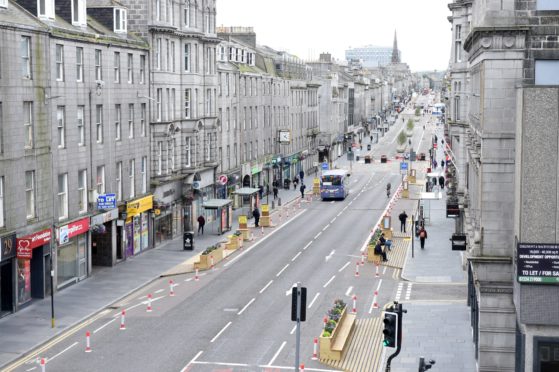Aberdeen leaders are hopeful that more housing in the city centre will help protect traders, after it emerged that almost a fifth of prime retail space on the famous Granite Mile is now empty.
In 2017 there were 24 closed units on Union Street and the number has now grown to 36 as the pandemic has hit hard.
Stiff competition from the Union Square and Bon Accord shopping centres, coupled with a rise in online shopping and working from home, have impacted recovery efforts on the city’s main thoroughfare.
But Aberdeen City Council co-leader, Douglas Lumsden, insisted that plans to stave off further decline are already in motion.
He said: “These figures are very worrying and reinforce the need for the city centre improvements that we have embarked on.
“The investment in the award-winning Aberdeen Art Gallery, the work to rejuvenate Union Terrace Gardens and our plan for city centre living will bring more people living and working into the city centre and provide a boost to the city.”
It has been a disastrous time for the Scottish high street with retailers losing out on £2.4 billion in revenue over the first seven months, compared to last year.
A study by the Centre for Cities think tank showed that Aberdeen has become the hardest-hit area in the UK with the number of job vacancies in the city dropping by 75% compared to 2019.
Yesterday, the Scottish Retail Consortium (SRC) published its submission to the Scottish Government ahead of this year’s Scottish budget, praising the support retailers have received during the pandemic.
Sent to finance secretary Kate Forbes, the document outlined ways of helping struggling businesses to survive.
David Lonsdale, SCR director, said: “In this desperately difficult time, businesses are looking for stability and support from the Scottish Government and MSPs.
“Retailers are focused on surviving rather than thriving under the pressure of depressed consumer confidence and Covid-19 restrictions.
“Retail sales have been negative for eight months, footfall is enormously down, and the shop vacancy rate is at a five-year high.
“Retailers want to see a Scottish budget which recognises this reality.
“That should include an early commitment to a phased re-introduction of business rates for retailers, a moratorium on non-Covid-19 regulation, and measures to drive consumer confidence.
“The retail industry has played a crucial role during the Covid-19 crisis to keep Scotland fed and supplied.
“Our members have invested tens of millions in making stores safe and supporting communities across the country.
“We will continue to back the government’s work in suppressing the virus – we hope they will back our industry by delivering a budget which provides stability and support for business.”
Moray Council has launched a £50,000 pop-up shop scheme in an effort to ensure its high streets remain vibrant despite the effects of Covid-19.
A similar project was run in Keith between 2012 and 2016 with 23 businesses taking part – three of whom later went on to take permanent residence on Mid Street, which went from the highest to the lowest unit vacancy rate in the region.
The initiative will be run by the council, providing retail space for new and growing retailers with participants only having to cover utility bills.
Units are expected to be provided in Elgin, Buckie, Forres, Keith, Lossiemouth, Aberlour and Dufftown over the next 14 months.
Gemma Cruickshank, manager of Elgin’s business improvement district, believes the initiative will provide space for retailers to grow.
She said: “For new or smaller businesses, they can test concepts and refine or adapt their plan to suit consumer tastes without the pressure of a long-term lease.
“With the right mix, shoppers are inspired to come and discover something new more frequently, and emerging businesses can test the water and create brand awareness.
“It could encourage new shoppers to the centre and boost footfall for the existing businesses and use vacant units.”
The local authority is also making grants of up to £50,000 available for start-up and growing firms in the food, drink and textile sectors to invest in new equipment.
Meanwhile, support of up to £10,000 is also being offered to pop-up participants wishing to find a permanent base.
Graham Leadbitter, chairman of Moray Economic Partnership, said: “Now is the chance to get a new business off the ground, to target a different audience in a different town, or to give businesses a boost.
“Shoppers in Moray love local brands, and we’ve a number of success stories from previous pop-ups. I hope they inspire others to follow their lead.”
Last week, city leaders sounded warnings about the potential impact of being placed in tier two of the Scottish Government’s new coronavirus restrictions.
They warned that businesses were in for more months of misery, and argued that the city should be placed in tier one alongside Moray and the Highlands.
